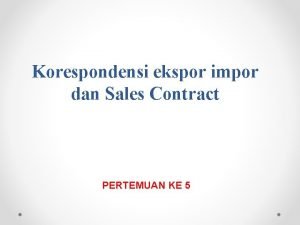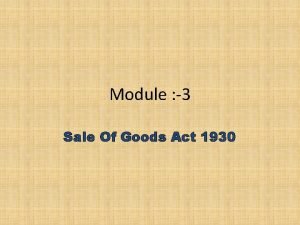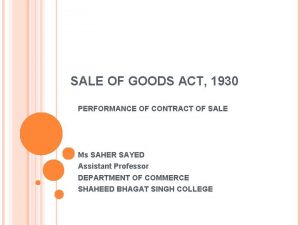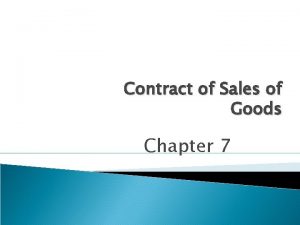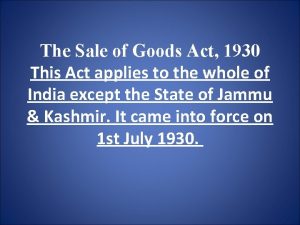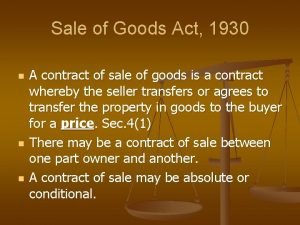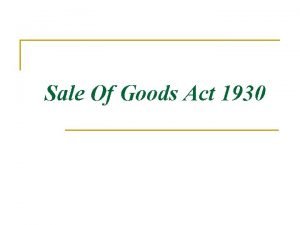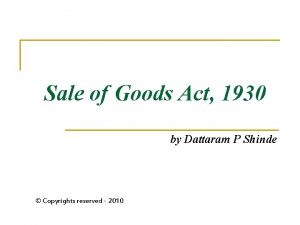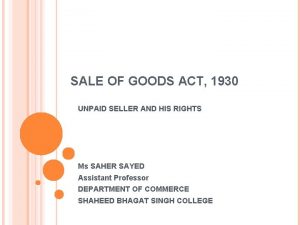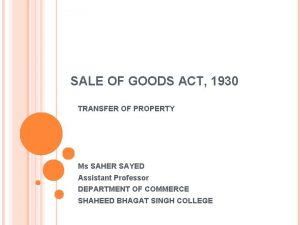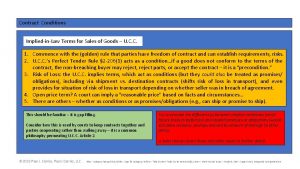SALES OF GOODS ACT 1930 FORMATION OF CONTRACT





























- Slides: 29

SALES OF GOODS ACT 1930 FORMATION OF CONTRACT OF SALE A contract of sale of goods is a contract whereby the seller transfers or agrees to transfer the property in good s to the buyer for a price. The term “Contract of Sale” includes two terms: v Sale: When a property in the goods is transferred from the seller to the buyer for a price is called sale; v Agreement to sell: Where the transfer of the property in the goods is to take place at a future time or subject to some conditions thereafter to be fulfilled, the contract is called an “agreement to sell”. 12/19/2021 Prof. (Dr. ) Ritu Gandhi Arora 1

An agreement to sell becomes sale when condition, subject to which the property in the goods is to be transferred are fulfilled or the time elapses. Essentials of a contract of sale: v Two Parties; v Goods (must be movable in nature) sale and purchase of immovable property does not come under the contract of sale: v Price (Consideration must be money not goods); v Transfer of general property; v Offer and acceptance; v Intention to create legal relationships; v Lawful consideration; v Competency of both the parties; v Free and Genuine consent; v Lawful object; v Agreement not declared void; v Certainty and Possibility of performance; v Legal Formalities. 12/19/2021 Prof. (Dr. ) Ritu Gandhi Arora 2

Difference between the Hire Purchase agreement and Sale Hire Purchase Agreement v Ownership is transferred from the seller to the buyer as from the seller to the hire soon as the contract is purchaser only when a entered in to: certain agreed number of is paid; v The position of the buyer is that of the owner; 12/19/2021 v The position of the hire purchaser is that of the bailee; Prof. (Dr. ) Ritu Gandhi Arora 3

v The buyer cannot terminate the contract and as such is bound to pay the price of the goods; v If the payment is made by the buyer in installments, the amount payable by the buyer to the seller is reduced, for the payment made by the buyer is towards the price of the goods 12/19/2021 Prof. (Dr. ) Ritu Gandhi Arora The hire purchaser has an option to terminate the contract at any stage, and cannot be forced to pay the further installments; v The installments paid by the hire purchaser are regarded as hire charges and not as payment towards the price of the goods till option to purchase the goods is exercised. v 4

Sale and Barter or Exchange: Where the property in goods a transferred from the seller to the buyer for a price, it is called a sale. Where goods are exchanged for goods, the transaction is called a barter and not a sale. Where a money is exchanged for money, it is transaction of exchange not of sale. Sale and Bailment: In a sale, the property in goods is transferred from the seller to the buyer. In a bailment, there is only transfer of possession from the bailor to the bailee. 12/19/2021 Prof. (Dr. ) Ritu Gandhi Arora 5

Classification of Goods Existing Goods Contingent Goods Future Specific Goods Ascertained Goods Un ascertained or Generic goods 12/19/2021 Prof. (Dr. ) Ritu Gandhi Arora 6

Explanation: Existing Goods: These are the goods which are identified and agreed upon at the time a contract of sale is made; a) Specific Goods: These are the goods which are identified and agreed upon at the time a contract of sale is made; b) Ascertained Goods: There are the goods which become ascertained subsequent to the formation of a contract of sale; c) Unascertained Goods: These are the goods which are not identified and agreed upon at the time of the contract of sale. They are defined only by description or may from a part of a lot. • • Future Goods: These are the goods which a seller dose not possess at the time of the contract but which will be manufactured or produced or acquired by him after making of the contract of the sale. 12/19/2021 Prof. (Dr. ) Ritu Gandhi Arora 7

Contingent Goods: These are the goods the acquisition of which by the seller depends upon a contingency which may or may not happen. Effect of Destruction of goods: • Goods perishing before making of contract: A contract for such goods is void; • Goods perishing after the agreement to sell before the sale is effected: An agreement to sell specific goods becomes void if subsequently the goods, without any fault on the part of the seller or buyer, perish or become so damaged. 12/19/2021 Prof. (Dr. ) Ritu Gandhi Arora 8

Above conditions apply on specific goods not on unascertained goods Document of Title of Goods A document of title of goods is one which enables its possess or to deals with the goods described in it as if he were the owner. It is used in the ordinary course of business as proof of the possession or control of goods. The price in a contract of sale means the money consideration for a sale of goods. It forms an essential part of the contract. It must be expressed in money. It is the consideration for the transfer or agreement to transfer the property in goods from the seller to the buyer. 12/19/2021 Prof. (Dr. ) Ritu Gandhi Arora 9

Conditions and Warranties Condition: A condition is a stipulation which is essential to the main purpose of the contract. It goes to the root of the contract. If there is a breach of a condition, the aggrieved party can treat the contract as repudiated (rejected). Warranty: A warranty is a stipulation which is collateral to the main purpose of the contract. If there is a breach of a warranty, the aggrieved party can only claim damages and it has no right to treat the contract as repudiated. 12/19/2021 Prof. (Dr. ) Ritu Gandhi Arora 10

Distinction between Warranty and Condition v Difference as to value: A condition is a stipulation which is essential to the main purpose of the contract. A warranty is a stipulation which is collateral to the man purpose of the contract; v Difference as to breach: if there is a breach of a condition, the aggrieved party can repudiate the contract of sale; in case of a breach of a warranty, the aggrieved party can claim damages; v Difference as to treatment: A breach of a condition may be treated as a breach of a warranty. This would happen where the aggrieved party is contented with damages only. A breach of a warranty, cannot be treated as a breach of a condition. 12/19/2021 Prof. (Dr. ) Ritu Gandhi Arora 11

When condition to be treated as warranty: a) v v b) Voluntary waiver of condition: Where a contract of sale is subject to any condition to be fulfilled by the seller, the buyer may: Waive the condition, or Elect to treat the breach of the condition as a breach of warranty. If the buyer once decides to waive the condition, he cannot afterwards insist on its fulfillment. Acceptance of goods by buyer: Where a contract of sale is not severable and the buyer has accepted the goods or part there of , the breach of any condition to be fulfilled by the seller can only be treated as a breach of warranty. 12/19/2021 Prof. (Dr. ) Ritu Gandhi Arora 12

Express and Implied Conditions and Warranties Express conditions and Warranties are those which are expressly provided in the contract Implied conditions and warranties are those which the law implies in to the contract unless the parties stipulate to the contrary. Implied Conditions: ì Condition as to title; ì Sale by Description: It may include the following situations: 12/19/2021 Prof. (Dr. ) Ritu Gandhi Arora 13

1. 2. 3. ì ì ì Where the buyer has not seen the goods and relies on their description given by the seller; Where the buyer has not seen the goods but he relies not on what he has seen but what was stated to him and the deviation of the goods from the description is not apparent; Packing of goods may sometimes be a part of the description; Conditions as to the quality of the fitness; Conditions as to merchantability; Conditions implied by custom; Sale by sample; Condition as to wholesomeness 12/19/2021 Prof. (Dr. ) Ritu Gandhi Arora 14

Implied Warranties: ì Warranty of quite Possession; ì Warranty from freedom from encumbrances; ì Warranty as to quality or fitness by usage of trade; ì Warranty to disclose dangerous nature of goods. 12/19/2021 Prof. (Dr. ) Ritu Gandhi Arora 15

Caveat Emptor – Let the buyer beware i. e. in a contract of sale of goods the seller is under no duty to reveal unflattering truths about the goods sold. Therefore, when a person buys some goods, he must examine them thoroughly. This principle states that it is for the buyer to satisfy himself that the goods which he id purchasing are of the quality which he requires. If he buys goods for a particular purpose, he must satisfy himself that they are fit for the particular purpose. Exceptions: 1. 2. 3. 4. 5. Fitness for buyer purpose; Sale under a patent or trade mark; Merchantable Quality; Usage of trade; Consent by fraud. 12/19/2021 Prof. (Dr. ) Ritu Gandhi Arora 16

Rights and Duties of the buyer 1. 2. 3. 4. 5. 6. q q q Right to have delivery as per contract; Right to reject the goods; Right to repudiate; Right to notice of insurance; Right to examine; Right against the seller for breach of contract: Suit for damage; Suit for Price; Suit for specific performance; Suit for the breach of warranty; Repudiation of contract before due date; Suit for interest. 12/19/2021 Prof. (Dr. ) Ritu Gandhi Arora 17

Duties of the seller : 1. 2. 3. 4. 5. 6. 7. 8. 9. Duty to accept the goods and pay for them in exchange for possession; Duty to apply for delivery; Duty to demand delivery at a reasonable hour; Duty to accepts installment delivery and pay for it; Duty to take risk of deterioration in the course of transit; Duty to intimate the seller where he rejects the goods; Duty to take delivery; Duty to pay price; Duty to pay damages for non acceptance. 12/19/2021 Prof. (Dr. ) Ritu Gandhi Arora 18

Performance of a Contract Performance of a contract of sale means: As regards the seller: delivery of the goods to buyer, and As regards the buyer: acceptance of the delivery of the goods and payments for them, in accordance with the terms of the contract of sale. A contract of sale always involver reciprocal promises, the seller promising to deliver the goods and the buyer promising to accept and pay for them. Delivery of Goods Delivery means voluntary transfer of possession of goods from one person to another. 12/19/2021 Prof. (Dr. ) Ritu Gandhi Arora 19

Types of Delivery of Goods Actual Delivery Symbolic Delivery Constructive Delivery Rules as to the Delivery of the goods EMode of Delivery: delivery should have the effect of putting the goods in the possession of the buyer or his duty authorized agent. Delivery of goods may be: Actual, Constructive, and symbolic; EDelivery and payment: concurrent conditions: delivery of the goods and payment of the price must be according to the terms of the contract; 12/19/2021 Prof. (Dr. ) Ritu Gandhi Arora 20

E Effect of part delivery: A delivery of part of the goods in progress of the delivery of the whole, has the same effect, for the purpose of passing the property in such goods, as a delivery of the whole; EBuyer to apply for delivery: Apart from any express contract, the seller of goods is not bound to deliver them until the buyer applies for delivery; EPlace of delivery: Where the place at which delivery of the goods is to take place is specified in the contract, the goods must be delivered at that place during business hours on a working day; 12/19/2021 Prof. (Dr. ) Ritu Gandhi Arora 21

ETime of delivery: where under the contract of sale the seller is bound to sent the goods to the buyer, but no time for sending them is fixed, the seller is bound to send them within a reasonable time; EGoods in Possession of third party: when at the time of the sale of the goods are with a third party, there is no delivery by the seller to the buyer until such third party acknowledges to the buyer that he holds them on his behalf; ECost of delivery: Unless otherwise, agreed, all expenses of and incidental to making of delivery are borne by the seller, but all expenses of and all incidental to obtaining of delivery are borne by the buyer; 12/19/2021 Prof. (Dr. ) Ritu Gandhi Arora 22

Delivery of wrong quantity: The delivery of the quantity of goods contracted for should be strictly according to the terms of the contract. The defective delivery entitles the buyer to reject the goods. The three different contingencies which may arise in case of a defective delivery: 1. Delivery of goods less than contracted for; 2. Delivery of goods in excess of the quantity contracted for; 3. Delivery of goods contracted for mixed with other goods; E Installment Deliveries: Unless otherwise agreed, the seller is not entitled to deliver the goods by installments and if he does so, the buyer is not bound to accept the goods. 12/19/2021 Prof. (Dr. ) Ritu Gandhi Arora 23

Rights of an Unpaid Seller Against the goods Against the buyer Personally Where the property in the goods has passed Lien Suit for Price 12/19/2021 Stoppage in Transit Suit for damages Where the property in the goods has not passed Resale Withholding Delivery Repudiation of contract Prof. (Dr. ) Ritu Gandhi Arora Stoppage in transit Suit for int. 24

Rights of an Unpaid Seller Who is an Unpaid Seller: � A seller is deemed to be an unpaid seller when the whole of the price has not been paid or tendered; �A bill of exchange or other negotiable instrument has been received as a conditional payment and the condition on which it was received has not been fulfilled by the reason of the dishonour of the instrument or otherwise. Rights of an Unpaid Seller Rights of an unpaid seller against the goods: Where the property in the goods has passed to the buyer, an unpaid seller has the following rights against the goods. 12/19/2021 Prof. (Dr. ) Ritu Gandhi Arora 25

� Right of Lien: A lien is a right to retain possession of goods until payment of the price. Rules regarding lien: 1. The seller may exercise his right of lien notwithstanding that he is in possession of the goods as agent or bailee for the buyer. If he loses the possession of the goods, he loses the right of lien also; 2. The lien depends on actual possession and not on title; 3. The possession of the goods by the seller must not expressly exclude the right of lien; 12/19/2021 Prof. (Dr. ) Ritu Gandhi Arora 26

4. The lien can be exercised by the unpaid seller only for the price and not for any other charges such as warehouse or dock charges; 5. Where an unpaid seller has made part delivery of the goods, he may exercise his right of lien on the reminder; 6. The unpaid seller of goods, having a lien thereon, does not lose his lien by reason only that he has obtained a decree for the price of the goods; � Right of stoppage of goods in transit: when the buyer of goods become insolvent the unpaid seller who has parted with the possession of the goods has the right of stopping them in transit; 12/19/2021 Prof. (Dr. ) Ritu Gandhi Arora 27

Right of Resale: the unpaid seller can resell the goods I. Where the goods are of a perishable nature; II. Where he has exercised his right of lien or stoppage in transit and given notice to the buyer of his intention to resell the goods and where the buyer has not within a reasonable time paid the price; III. Where the seller expressly reserves a right of resale in case the buyer should make default. Rights of an Unpaid seller against the buyer personally: � Suit for price; � Suit for damages for non acceptance; � Repudiation of contract before due date; � Suit for interest. 12/19/2021 Prof. (Dr. ) Ritu Gandhi Arora 28

Remedies for Breach of contract of sale Seller’s suit: �Suit for price; �Suit for damages for non acceptance of the goods; �Suit for damages for repudiation of contract by the buyer before due date; �Suit for interest. Buyer’s Suit : �Suit for damages for non delivery of the goods; �Suit for specific performance; �Suit for damages for repudiation of contract by the seller before due date; �Suit for interest. 12/19/2021 Prof. (Dr. ) Ritu Gandhi Arora 29
 Sale of goods act 1930 introduction
Sale of goods act 1930 introduction Convenience goods shopping goods specialty goods
Convenience goods shopping goods specialty goods Progressive tax definition
Progressive tax definition Merit goods vs public goods
Merit goods vs public goods Public goods dan private goods adalah
Public goods dan private goods adalah Ifrs 15 steps
Ifrs 15 steps Contingent contract and wagering contract
Contingent contract and wagering contract A company has sales of 695 000 and cost of goods
A company has sales of 695 000 and cost of goods Contoh sales contract perdagangan internasional
Contoh sales contract perdagangan internasional Export sales agreement
Export sales agreement Macbeth act 2 summary
Macbeth act 2 summary Formation initiale vs formation continue
Formation initiale vs formation continue Sales organizational structure
Sales organizational structure Discuss the nuances of sales letters.
Discuss the nuances of sales letters. Sales potential vs sales forecast
Sales potential vs sales forecast Sales organization structure and sales force deployment
Sales organization structure and sales force deployment Sales quotas and territories
Sales quotas and territories Maycomb alabama 1930
Maycomb alabama 1930 Nguyễn ái quốc 1930
Nguyễn ái quốc 1930 1930-1939 fashion
1930-1939 fashion 1930 pop culture
1930 pop culture Bestia que sale del mar
Bestia que sale del mar Pobednici svetskog prvenstva u fudbalu
Pobednici svetskog prvenstva u fudbalu Futsal history
Futsal history 2007-1930
2007-1930 Kaj je ekspresionizem
Kaj je ekspresionizem đảng cộng sản việt nam 1930
đảng cộng sản việt nam 1930 คืออะไร
คืออะไร Lineas de desarrollo vigotsky
Lineas de desarrollo vigotsky All three round table conference
All three round table conference








